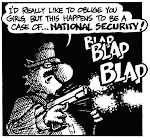Friday, April 10, 2009
TAPED EVIDENCE THAT ARMY IS CONCEALNG POST-TRAUMATIC STRESS DISORDER AMONG VETS
Michael de Yoanna and Mark Benjamin, Salon - For more than a year [Sergeant X] been seeking treatment at Fort Carson for a brain injury and post-traumatic stress disorder, the signature injuries of the Iraq war. Sgt. X is also suffering through the Army's confusing disability payment system, handled by something called a medical evaluation board. The process of negotiating the system has been made harder by his war-damaged memory. Sgt. X's wife has to go with him to doctor's appointments so he'll remember what the doctor tells him. . .
When she couldn't accompany him to an appointment with psychologist Douglas McNinch last June, Sgt. X tucked a recording device into his pocket and set it on voice-activation so it would capture what the doctor said. Sgt. X had no idea that the little machine in his pocket was about to capture recorded evidence of something wounded soldiers and their advocates have long suspected -- that the military does not want Iraq veterans to be diagnosed with PTSD, a condition that obligates the military to provide expensive, intensive long-term care, including the possibility of lifetime disability payments. And, as Salon will explore in a second article, after the Army became aware of the tape, the Senate Armed Services Committee declined to investigate its implications, despite prodding from a senator who is not on the committee. The Army then conducted its own internal investigation -- and cleared itself of any wrongdoing. . .
"OK," McNinch told Sgt. X. "I will tell you something confidentially that I would have to deny if it were ever public. Not only myself, but all the clinicians up here are being pressured to not diagnose PTSD and diagnose anxiety disorder NOS [instead]." McNinch told him that Army medical boards were "kick[ing] back" his diagnoses of PTSD, saying soldiers had not seen enough trauma to have "serious PTSD issues."
"Unfortunately," McNinch told Sgt. X, "yours has not been the only case ... I and other [doctors] are under a lot of pressure to not diagnose PTSD. It's not fair. I think it's a horrible way to treat soldiers, but unfortunately, you know, now the V.A. is jumping on board, saying, 'Well, these people don't have PTSD,' and stuff like that."
Subscribe to:
Post Comments (Atom)



























No comments:
Post a Comment